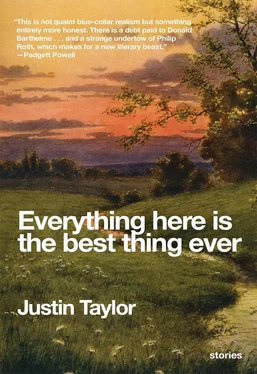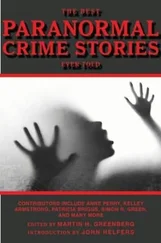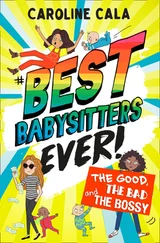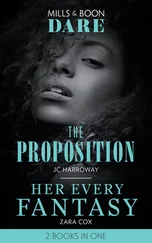“MURDERERS,” my father said.
“They can even be all three,” I said.
“Please,” my mother said.
“Okay,” Rusty said. “We’re leaving the table now.”
“You may be excused,” my mother said.
“It wasn’t a question,” Rusty said.
“Thanks for dinner, Mr. and Mrs. Kessler,” Dara said.
“What a shame,” my grandfather said. “A boy who can’t respect his own heritage.”
“I’m twenty-three,” I said.
“And after everything you fought for,” my father said. “In the war.”
“The things I saw,” my grandfather said. “Things I couldn’t even tell you.”
I happen to know that my grandfather never saw any combat, or liberated any camps. He was part of a company that mostly ran supplies from one base to another. The only time he even fired his ser vice rifle was when he happened upon a poor, war-burdened peasant family in some rural area and took down a deer with one perfect shot. And the peasant family was so thankful and had plenty to eat and hugged him and wished him good luck and he never had to fire the gun again.
Come to think of it, that might have been my other grandfather’s story. They were both enlisted men. But how hard is that to picture? These crabby old Jews with their hiked-up pants and endless kvetching. And one of them I haven’t laid eyes on in how many years? These guys, I’m supposed to believe, won a war.
I’m not a bad son. Only prodigal. I know they fought and served, I just can’t picture it. You know? My dad, now him I can picture — I’ve seen the pictures. Vietnam? Student deferment. Like a good Jewish boy? Yeah, with the hair down to his ass and the leather vest. Like you wouldn’t believe. Imagine what his mother, the Polish immigrant, must have said.
It got late. The parents and grandparents went to bed. So, I decided, what better time to bond with the brother? I knocked on his bedroom door. Turned out Dara was still hanging around. Well, what the heck? Bond with her, too.
I filched a bottle of scotch from my parents’ liquor cabinet and brought it upstairs, but they turned up their noses, so I brought them down to help choose. Vodka they were happy with. Don’t ask me why. “Maybe it’s the Russian blood,” I said, as we walked with our fixed drinks out of the kitchen, through the living room, out to the deck.
“Huh?” Rusty said.
“The Russian in us. On Dad’s side. Grandpa was born in Odessa, I think. Or his parents were. Somebody came over.” We raised our glasses and drank. Rusty lit a cigarette.
It got really late. The deck chairs were dusted with that grayish outdoorsy shmutz they get, so we were sitting on the deck itself, our backs against the quiet house. We stared into that country darkness. Rusty kept stubbing his smokes out on the deck; really grinding them in. One after another after another. I kept waiting for the drinks to loosen him enough that he’d spill his guts, his secret hopes, something I could bond with, but he only looked off into the night or down at the pile of butts, which he’d arranged in a tiny pyramid.
“That’s, uh, pretty cool,” I said.
“That’s gross,” Dara said.
“You know what?” Rusty said. “I’m going to bed.”
“I love you — bro,” I said.
“Yeah, well.” My brother went inside. Christ, he could be a pill sometimes. I thought it was damn decent of Dara to wait a few courtesy minutes before taking her leave. We shared a little silence, during which I turned the words “good Southern breeding” over and over in my mind, as if they were a little gem I was inspecting. But then I noticed that she still didn’t seem to be going anywhere. And had she slid closer?
“So it’s, uh, pretty cool that you’re still here, uh, hanging out with me,” I said.
“I don’t want to die a virgin,” Dara said, eyes on her drink.
Ahh shit, I thought. Loosened the wrong one.
“Like if I did get blown up on a bus or something. I’d have never even known what it was like.”
“You’re a virgin?”
“Does that surprise you?”
I didn’t have an answer to that question.
“What about my brother?” I asked.
“Oh come on, he’s like my best friend,” she said. That had actually been my point. If you can’t sublimate your fear of mortality into sex with your best friend, what’s it there for?
“And there’s no other guy at your school?” I said.
“Lose it to a goy?” she said, almost too bewildered by the suggestion to be dismayed by the prospect. Another silence ensued.
“You’re not going to get killed in a terrorist bombing,” I said, finally.
“You don’t have to bullshit me,” she said. “I know what you think of Israel.”
“That a fact?”
“Russ told me how you hate their government.”
“Well, to be fair,” I said. “I hate every government, I guess, but why hate, say, the French government? I don’t even know any French. I hate the government of the United States because it’s mine, and so I can. And I hate the government of Israel because I’m a Jew, so I can do that too. Hating the government is every citizen’s duty.”
“You don’t hate them because they deserve it?” she asked.
“Oh, they deserve it,” I said. “But that’s sort of not even the point.”
The syrupy cloy was fresh all over again when we stepped inside, and lightly sickened my drunk. I took a deep breath and held it; the air filled my lungs and burned there. A strong hit of good Jewish guilt. I was conscious of the muted noise we made, shuffling across the carpet, the creak of the stairs, but these little sounds — it was becoming clear — weren’t going to wake anybody up. It’s hard to be at ease in a new place. Home is not the place you own, or even where you go back to. Home is the place whose exigencies you most fully comprehend and can account for. I was sitting on the edge of my bed in the dark. This was Dara’s house more than it was mine. She knew it better, and no reason why she shouldn’t. After all, she’d spent more time here than I had, or would.
I thought back on our family’s old house in Miami, how Dad used to set the burglar alarm before he went to bed. I’d come home late and it would make a long low beep when I opened the door, then I’d have twenty-five seconds to get to the keypad and punch in the code or the siren went off. My brother maybe couldn’t admit it yet, but he had to see that some things were better here.
I heard the low flush of a toilet, followed by the still-softer sound of water in the basin of the sink. There was brightness at the end of the hall, then darkness once more. Dara was one moving shadow in a sea of them, barely distinct against the deep blue of my bedroom door, which she had shut softly behind herself. She stood still a moment, in the gloom, then slid into focus as she crossed the room. By the time she reached me she was a girl again.
I’d been working at the plant awhile and had hit a kind of rough patch, but there were also good things, like my girl June, and I kept telling myself that it would be all worth it. We were going to make it big, her and me.
Then these angels came, a whole band or regiment or whatever it is they’ve got up there. The angels said June’s beauty was unsurpassed by any human ever before or after, which of course I told them I already knew. They didn’t seem impressed. Thought they were better than me — it was obvious. Then they said she was too beautiful to even live and that they would take her life. I told them I thought that was some bullshit.
The Archangel Gabriel related the following:
And God so loved the world, that He gave unto them His only begotten Son, that whosoever believeth in Him shall live forever and never die. This made the angels cry in jealousy. And sob, their faces hidden, their angelic voices muffled by the sleeves of their dampening robes. In the absence of their interminable praise-songs it was suddenly clear just how drafty and solemn the high-arched domes of the Heavenly Vault had been built, footsteps and shuffling wings echoed creepily, and the balustrades — gilded and with their Roman columns — suddenly seemed gaudy and more than a little bit lame. This suddenness was contradictory to what Augustine had written about the eternal unchanging nature of God and the old saint, filled with shame, stalked to the far reach of some gray cloudbank where he sulked and remembered how it had been back in the good old days when the Church first aligned with Empire. So a meeting was called, handbills passed out, an ad hoc committee formed to facilitate. Eventually, an agreement with management was reached. The angels would return to their singing and to watching over humans — with a thirteen and a half percent increase in pay and six extra vacation days per annum (the proceedings were conducted partially in Latin, for nostalgic reasons). As well, the angels’ union would draft a team of seven (naturally, this being the Number of God) from their membership, and these would go down to earth and take away the most beautiful of all God’s beloved humans and that token gesture — it was decided — would reset the balance in the question of who God loved best and then all business as usual could continue for all time, until the inevitable and imminent Apocalypse that is like a slow train coming from a short ways off.
Читать дальше












